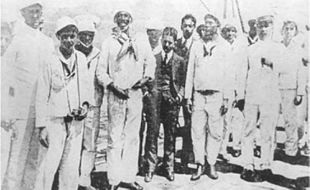
Back Revolta da Chibata German Revuelta del Látigo Spanish Révolte du fouet French Rivolta della frusta Italian Pemberontakan Cemeti Malay Revolta da Chibata Portuguese

The Revolt of the Lash[A] (Portuguese: Revolta da Chibata) was a naval mutiny in Rio de Janeiro, Brazil, in late November 1910. It was the direct result of the use of whips ("lashes") by white naval officers when punishing Afro-Brazilian and mixed-race enlisted sailors.
At the beginning of the new century rising demand for coffee and rubber enabled Brazilian politicians to attempt to transform their country into an international power. A key part of this would come from modernizing the Brazilian Navy, which had been neglected since the coup, by purchasing battleships of the new "dreadnought" type. Social conditions in the Brazilian Navy, however, did not keep pace with this new technology. Elite white officers were in charge of mostly black and mixed-race crewmen, many of whom had been forced into the navy on long-term contracts. These officers frequently inflicted corporal punishment on the crewmen for major and minor offenses alike despite the practice's ban in most other countries and in the rest of Brazil.
As a result of this violence, sailors launched a carefully planned and executed mutiny in Rio de Janeiro on 22 November 1910. Led by João Cândido Felisberto, these men managed to take control of both dreadnoughts, one brand-new cruiser, and an older coastal-defense ship, giving them firepower that dwarfed the rest of the navy. To capitalize on the threat these ships posed to the Brazilian capital, the mutineers sent a letter to the government that demanded an end to what they called the "slavery" being practiced by the navy.
While the executive branch of the government plotted to retake or sink the rebelling warships, they were hampered by personnel distrust and equipment problems; historians have since cast doubt on their chances of successfully accomplishing either. At the same time, Congress—led by Senator Rui Barbosa—pursued a route of amnesty, appointing a former navy captain as their liaison to the rebels. This latter route was successful, and a bill granting amnesty to all involved and ending the use of corporal punishment passed the lower house by a veto-proof margin. However, many of the sailors involved were quickly discharged from the navy, and many of the original mutineers were later thrown into jail or sent to rubber collecting regions in the Brazilian Amazon.
Cite error: There are <ref group=upper-alpha> tags or {{efn-ua}} templates on this page, but the references will not show without a {{reflist|group=upper-alpha}} template or {{notelist-ua}} template (see the help page).